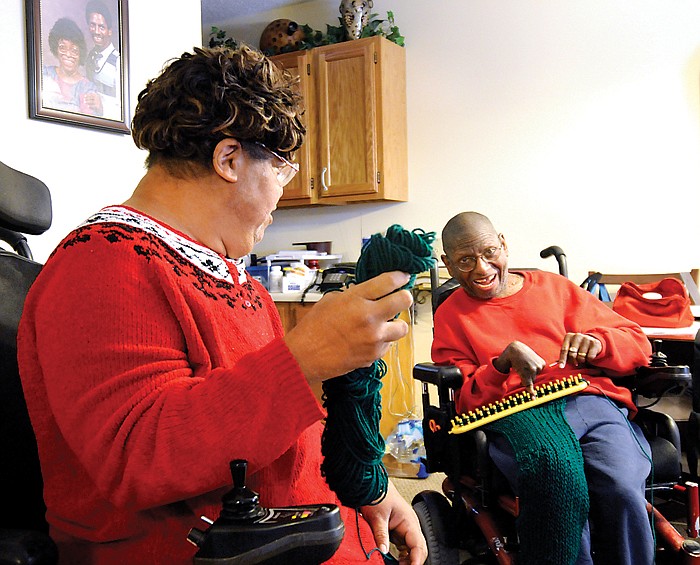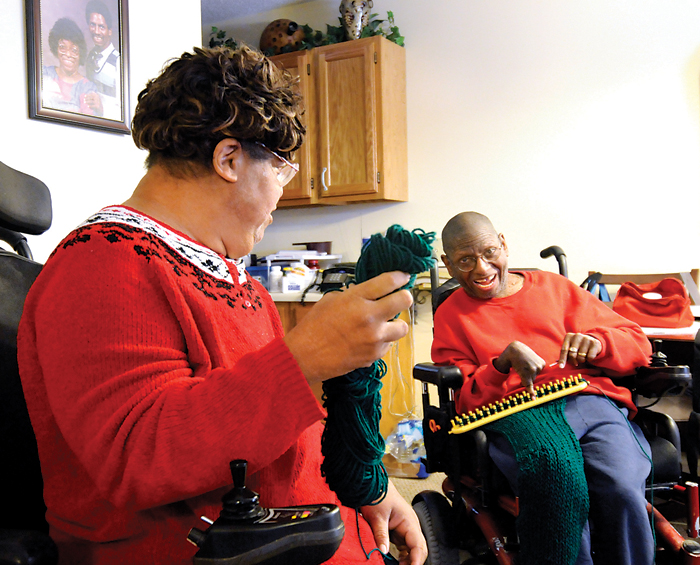Jeanice Seab will tell you she first loved her husband, Clifford, when she was just 5.
At the time, they were both students at Sunbeam, a school in Cleveland, Ohio, where children classified as special needs - the ones born with cerebral palsy like her and Clifford - were sent in the early 1960s.
When she was supposed to be focusing on her physical therapy classes, she watched the small 10-year-old boy who stuttered and walked on crutches and was lovesick.
Every day she asked if he was at school, traveled the long way to class, hoping to brush past him, hoping he would say hello.
"I really think [what drew me] was just his eyes. He didn't talk very much. To me, he was cute," said Jeanice, now 55. "[People] told me ... 'if it's meant to be, it will be.'"
Years later they would marry and are still together today - 30 years come October.
When Clifford and Jeanice married in 1981, few of their acquaintances believed the couple could survive the relationship. Over the years, even the Seabs had their doubts.
It's hard for two people to commit to each another for a lifetime, and it's harder when those two people struggle to even care for themselves, when it's a fight to walk, to speak, to reach for a can of soup, to take a bath, to crawl into bed at night.
"The average person would ask, 'How can two people who are disabled even consider coming together independently?'" said Peggy Fryer, who works with United Cerebral Palsy in Tennessee. "You would look at them and see all the can't."
The odds of a successful marriage were slim, at best, she said.
***
After high school, Clifford left Sunbeam to attend a local community college. For six years, Jeanice fantasized about running into him and telling him how she had loved him all those years.
Then there he was. He walked with a cane into a screen printing business where she and other disabled people did odd jobs. He said he would be starting a job at the printing shop.
"I looked at him and I thought, 'I know him. I know him.' But he didn't say anything to me. So I took his name and tried to be very professional. I didn't want to jump up and go 'Oh,'" she said. "He gave me chills."
At lunch, she stared at him from across the room. Then their eyes met, and Clifford yelled out Jeanice's name.
"He knew me! He remembered me!" she said.
For nearly six months, neither would tell their mothers about their budding romance. They met at church or work and talked long hours on the telephone at night. Sometimes, Clifford wrote her poems. He first kissed her three months after they started dating.
In secret, they made plans, signed up for classes that taught them to cook meals, make a budget, hem a pant leg.
Clifford found them a small apartment close enough to church for them to walk to services. Even with all the trouble he had standing and walking, he managed to get down on both knees and proposed to her with a $200 engagement ring.
His mother yelled at him when he told her the news.
"She said, 'You don't know what you're doing. How are you going to su? How are you going to live?'" he said.
Jeanice's mother wouldn't attend the wedding and told her daughter she wouldn't speak to her again if she married.
After the wedding, Clifford's mother hired a lawyer to try to annul the marriage.
"When you are disabled, the parents are afraid to let go. They wanted to know how we are going to do this alone when we had depended on them for so long," Jeanice said. "They didn't believe we could manage."
At one point, Clifford thought about ending the marriage and moved back with his mother for three months. During the separation, he said he snapped, couldn't take being away from Jeanice. He told her to pack a trunk full with clothes and get what was left in their checking accounts. Together they had $114, enough for two tickets on a Greyhound bus from Cleveland to Chattanooga.
They didn't tell anyone they were leaving.
"It was like Romeo and Juliet," Jeanice said.
Neither of them ever saw their mothers again. Both have since died.
***
Sometimes it's hard for Clifford and Jeanice not to wonder if their families were right. There is no cure for cerebral palsy, and age, accidents and sickness over the years have further restricted their limited movement.
They move around their house - built for them six years ago by Habitat for Humanity - in wheelchairs and every night set aside 30 minutes to pull each other into bed. Once a week, a woman comes to help them wash their dishes and clothes and cook.
Last year, when Jeanice was diagnosed with Stage 3 breast cancer and underwent 33 treatments of chemotherapy and radiation, Clifford worried he would lose her.
"She's not only the love of my life, she's the reason I get up every day," said Clifford, 59.
The Seabs know there are thousands of things that could have or still could pull them apart, but they try not to dwell on those.
"There are days when you get frustrated and say 'I can't handle this,' but you can't just give up," said Jeanice. "They said it's going to be difficult. Well fine; it's difficult. You do what you have to do. You don't throw in the towel."


